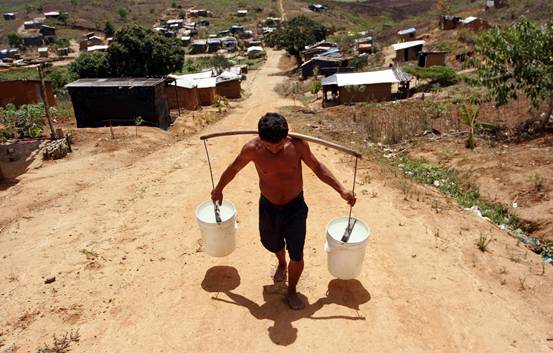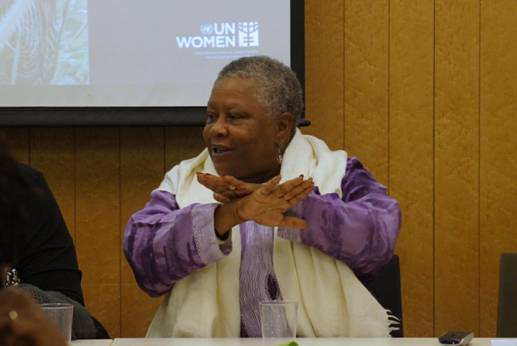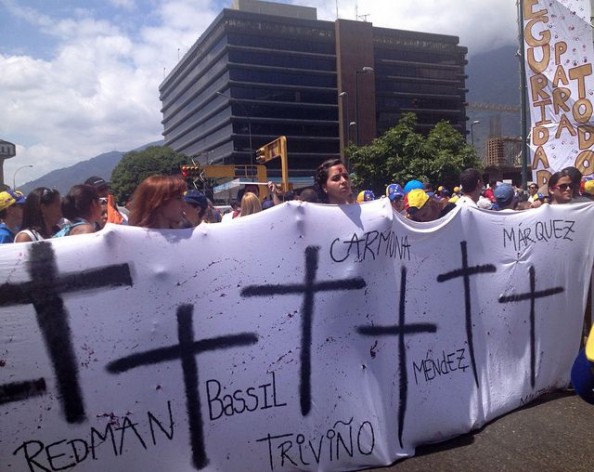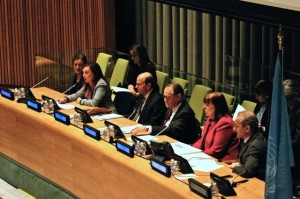“We must not forget the difference this treaty will make, if well implemented, for the lives of so many,” said [...]]]>
“We must not forget the difference this treaty will make, if well implemented, for the lives of so many,” said UN Deputy Secretary-General Jan Eliasson.
Adopted by the UN General Assembly by a 154-to-three votes in April 2013, the ATT is a multilateral treaty regulating the 85 billion dollar annual international trade in conventional weapons.
To date, the agreement has been signed by 118 member states, but 50 ratifications are still required for entry into force.
Eliasson warned that civilians are still being killed and driven from their homelands, as weapons and ammunition remain in the hands of human right abusers and terrorists. According to Amnesty International, 500,000 civilian lives are lost each year in armed conflicts.
“Every day, we witness the human cost of the irresponsible transfer of weapons,” he added. He also highlighted that “good things can be achieved when governments and civil society work together through the United Nations.”
In a statement Wednesday, UN Secretary-General, Ban Ki-moon encouraged all other States to sign and ratify the ATT “without delay.”
He also called on States, civil society, and international and regional organisations “to continue working together to ensure the ATT can play its full role, in helping to reduce needless human suffering and build a safer world for all.”
“No-where is the need for an effective treaty so apparent as in the devastating humanitarian crisis in Syria,” stressed Anna Macdonald, on behalf of the Control Arms Coalition.
War in Syria has killed over 150,000 people and over nine million are in dire need of humanitarian aid.
The conflict has been fuelled by transfers of arms, munitions and ammunition from outside parties. From 2000 to 2010, it is estimated that Russia sold around 1.5 billion dollars worth of arms to Syria, making Damascus Moscow’s seventh-largest client.
Today, the United States is responsible for more than 30 percent of global arms sales. The ATT has been criticised specifically by the National Rifle Association (NRA), the biggest single arms lobby in the country..
The NRA’s campaign is based on the right to bear arms, which is protected by the Second Amendment to the US Constitution.
Opposition to the treaty also came from some member states and civil society groups. During negotiations, several countries such as Cuba, Venezuela, Egypt and Iran held strong concerns about the implications of the ATT for national sovereignty.
Many African countries consider the treaty would not be efficient without any restrictions on the ammunition trade. A 2012 Conflict Armament Research reports that ammunition being delivered by Iran is used in 14 African countries; among them, only four are used by governmental forces.
Within the 18 countries, France and the United Kingdom ratified the treaty at the ceremony on Wednesday.
“It is extremely positive that five of the world’s biggest arms exporters are among those ratifying today,” Macdonald said. She also emphasised the need for governments to implement the ATT very seriously.
“This is a treaty about saving lives. It will require changes in legislation, and it must achieve changes in behaviour,” she added.
The Director and Deputy to the High Representative for Disarmament Affairs, Virginia Gamba, said the ATT could enter into force in the second half of this year.
Jonathan Rozen is a trainee at the United Nations office of IPS.
]]>Failure to account and justify lethal drone activity by the United States represents a major violation of international law and international human rights law, a former U.N. rapporteur said Wednesday.
Since the beginning of drone attacks in 2001, the U.S. has conducted around 450 lethal drone strikes that have [...]]]>
Failure to account and justify lethal drone activity by the United States represents a major violation of international law and international human rights law, a former U.N. rapporteur said Wednesday.
Since the beginning of drone attacks in 2001, the U.S. has conducted around 450 lethal drone strikes that have raised humanitarian and international legal issues.
“About 370 have taken place in Pakistan, with the next largest, 60 to 70, in Yemen,” said Steve Coll, dean of Columbia’s Journalism School, and a former Pulitzer prize winning reporter for the Washington Post and New Yorker.
Speaking during a panel discussion, he said: “The peak was in 2010 where there were 120 drone strikes in Pakistan. That equates to about one every three days.”
With reports by Pakistan military stating that 2,160 militants and 67 civilians were killed through drone attacks that were carried out through covert operations, the panel agreed that the U.S. government needs to address this human rights issue.
Former UN Special Rapporteur on extrajudicial, summary or arbitrary executions Philip Alston said the U.S. failed to justify the basis for the use of armed drones, failed to acknowledge if a law has been broken or if civilian casualties have occurred.
“This failure regardless of anything else represents a major violation of international law and sets the U.S. up as an actor that sees itself as not accountable,” he said.
“The entire structure of both international humanitarian law and human rights law are premised on the notion that states accused of violating laws will respond with sufficient information to enable an evaluation and assessment to be undertaken.”
“There have been two fronted covert aerial wars in two different settings. The Obama administration finally acknowledged (in 2013) for the first time that the drone campaign exists,” Coll said.
Although the use of drones lies under U.S. law and policy framework of a “memorandum of notification”– a legal document authorised by the U.S. president to the Central Intelligence Agency (CIA) to carry out covert action — it does not mean it aligns with international law, he said.
Alston added that after he challenged the CIA about the strikes, he received no response as to their involvement and rationale.
He said the response he did receive was that “we, the CIA have no obligation to tell you anything and we have not told you anything. What we have done is to leak various statements when it suits us, including the John Brennan (director of the CIA) statement that not a single civilian was killed.”
The controversial topic of drone strikes by the U.S. has raised concern from numerous organizations, including the United Nations.
In a statement last August, Secretary-General Ban Ki-moon said that the use of armed drones should be subject to the rules of international law and international humanitarian law.
He added, “Every effort should be made to avoid mistakes and civilian casualties.”
The United Nations has deployed unarmed drones, which it describe as unmanned aerial vehicles (UAVs) , in at least one of its peacekeeping missions in Africa.
 Jassmyn Goh is a trainee at the IPS United Nations bureau in New York.
Jassmyn Goh is a trainee at the IPS United Nations bureau in New York.
]]>
Increasing global demand for energy will affect the already acute fresh water shortage, according to the latest United Nations World Water Development Report (WWDR) launched in Tokyo Saturday on the occasion of World Water Day.
The report highlighted a glaring lack of coordination between energy and water management [...]]]>
Increasing global demand for energy will affect the already acute fresh water shortage, according to the latest United Nations World Water Development Report (WWDR) launched in Tokyo Saturday on the occasion of World Water Day.
The report highlighted a glaring lack of coordination between energy and water management systems, despite the fact that places where people have inadequate access to water largely coincide with those where people have no electric power.

A man hauls water at the Chico Mendes landless peasant camp in Pernambuco, Brazil. Credit: Alejandro Arigón/IPS
More than 750 million people in the world have no access to clean water, and more than a billion people are not connected to an electric power grid.
Improving access to those vital resources means recognising the interdependence of water and energy for sustainable development, said Irina Bokova, director-general of the U.N. Educational, Scientific and Cultural Organisation (UNESCO).
Energy production accounts for roughly 15 percent of water withdrawal annually. By 2035, that number will rise to 20 percent due to population growth, urbanisation, and changing consumption patterns.
Similarly, declining water resources also have direct repercussions on the demand for electricity, which is expected to rise by 70 percent by 2035, mostly due to developments in India and China. Already those two countries are home to the largest number of people without access to water: 108 million in China and 99 million in India wake up every morning knowing it will be a life or death search for that precious resource.
Electric power plants, which produce 80 percent of the electricity worldwide, need large quantities of water for the cooling process. Water is also guzzled during energy production and for the extraction of fossil fuels. Likewise, the collection, transport and treatment of water consume massive quantities of energy.
Meeting the power challenges means creating systems that allow for the combined production and management of water and electricity, concludes the World Water Assessment Programme (WWAP), which produced the report.
The report also provides pricing solutions for the crisis, suggesting that the two resources be sold at rates that reflect more accurately their cost and environmental impact. Current water prices hardly reflect the true cost of provision, keeping in mind that it is an essential resource for all life on earth. Higher prices could encourage energy producers and users to value and save water, experts say.
Improving water and energy efficiency means embracing methods such as energy generation through water recycling. Such projects are already being implemented and are likely to spread in the future. In Chile, for example, the Farafana plant treats 50 percent of the wastewater of Santiago, producing alternative energy for 100,000 residents.
U.N. Secretary-General Ban Ki-moon said Friday that water and energy “interact with each other in ways that can help – or hinder – our efforts to build stable societies and lives of dignity for all.”
Anicée Gohar is a trainee at the IPS United Nations bureau.
]]>The topic of natural resource management posed a critical question during the current 58thsession of the Commission on the Status of Women (CSW): how can women utilize their knowledge for managing natural resources to promote peace and develop themselves?
The answer lays in the experiences of local Liberian women who [...]]]>
The topic of natural resource management posed a critical question during the current 58thsession of the Commission on the Status of Women (CSW): how can women utilize their knowledge for managing natural resources to promote peace and develop themselves?
The answer lays in the experiences of local Liberian women who actively encouraged their fellow citizens to educate themselves about land ownership and management - especially because women own less than one percent of the land in Liberia.
In a partnership with United Nations Peacebuilding Support Office(PBSO) and United Nations Entity for Gender Equality and the Empowerment of Women (UN Women), civil society, governments and non-profit organizations met to discuss the mobilization of women and natural resources in a CSW side event titled ‘Turning Money into Honey: Women’s Role in the Management of Natural Resources and Extractive Industries in Liberia for Durable Peace.’

Etweda “Sugars” Cooper addresses audience at CSW side event on women and natural resource management in Libera. Credit: Lusha Chen/IPS
A new report (Women and Natural Resources – Unlocking the Peacebuilding Potential) by UN Women, United Nations Development Programme (UNDP), United Nations Environmental Programme (UNEP) and PBSO explores the relationship between women and natural recourses, in order to strengthen women’s contribution to resolving conflict, entities should focus on how women manage, use and make decisions about natural resources
“We are the drivers of our country.” said Edtweda “Sugars” Cooper, a leader of the Liberian women’s movement who spoke during an informal meeting at the Swedish mission Wednesday afternoon.
Land in particular, is one of the most important aspects of a woman’s livelihood in Liberia and has recently been a topic of controversy as corporate companies seek economic gains within the country.
Alice “Old-Lady” Kamara, a rural women’s activist and head of the women’s “Peace Hut” in Henry’s Town, Gbarpolu County, Liberia told the story of a logging company that destroyed forests, damaged roads and ultimately polluted the water system.
The situation came to a head when Kamara and other local women took matters into their own hands and rallied against the logging company, creating a roadblock and driving them out of the town.
The women feared the destruction of their roads would prevent them from transporting goods to the market – an essential part of both their economic and social development.
This form of retaliation served as a reminder to governments and big corporations that women in Liberia view the land not only as a means to create a life, but also as an empowerment tool.
“You can’t take away our livelihood.” Cooper said, commenting on the importance of allowing women to stand up to corporations and authorities that dismiss their eligibility to manage natural resources.
“Women are skilled, we’re are managers. In Liberia, in a farming community, the woman will clear the land; she plants, she harvests, she processes, she markets the produce from the land.”
UN Women together with their counterparts in Liberia call for the recognition of women as integral land developers, managers and business owners.
Using Liberia as a success story, three major points are defined: education of women in such a way that promotes skill, literacy and empowerment, enforcement of gender sensitivity from the local level to the parliamentary level and economic investment for locally owned businesses.
After a 14-year civil war that left the country destabilized, Cooper believes no one should underestimate the strength of women in Liberia. “We bring skills to the table and those skills will help with the development of our country.” she said.
Liberia is home to over three million people and according to UN Women—about half of them are women.
UN Celebrates Cultural Diversity and Multilingualism
By Jean-Baptiste Viallet
UNITED NATIONS, Mar 21 2014 (IPS) – “We live in a multicultural world. The language we speak affects both the way we think and act,“ said Under-Secretary-General Peter Launsky-Tieffenthal, the UN Coordinator for Multilingualism, at a roundtable discussion on the occasion of the International Francophonie Day on Thursday.
The discussion focused on both cultural diversity and multilingualism, which play an essential role to spread the message of the United Nations throughout the world.
Currently, about 220 million people speak French in 77 countries that are official members of the International Organization of la Francophonie (IOF).
Panelists highlighted the importance of multilingualism for a better understanding of the contemporary world. “Multilingualism is a basic condition to the establishment of an international cooperation,” said Launsky-Tieffenthal, head of the department of public information (DPI).
He added that cooperation and common values have the power to reinforce creativity and build a more inclusive society.
Ambassador Mohammed Loulichki, Permanent Representative of Morocco to the United Nations and President of the Group of Francophone Ambassadors, stressed the need to stand up for multilingualism, which is a federative and connected process.
“Diplomacy and culture have so much in common,” he said.
Manu Dibango, a well-known Cameroonian saxophonist, singer and UNESCO Artist for Peace in 2004, underscored the contribution of artists with a view to peace.
“The constant struggle for peace still exists because war is still in place,” said Dibango. “Between peace and war, artists try to create room for dreams.”
The Chief of Cabinet of the UN High Representative for the Alliance of Civilizations, Tariq Al-Ansari,singled out the issue of cultural diversity and multiculturalism in the service of effective international action.
He said that Francophonie is not only a language; it is also about how civilizations can share and communicate with each other.
“Better languages provide better opportunities to understand each other correctly,“ Al-Ansari added. “Francophonie is a catalyst between nations,“ he stated.
By its singular network throughout five continents, and by educational, cultural and political initiatives, Francophonie contributes to the elaboration of a better comprehension between nations.
“Culture must play a stabilizing role as regards human rights and development,” said Filippe Savadogo, Permanent Representative of the IOF to the United Nations.
Quoting Léopold Sédar Senghor, Senegalese poet, politician, cultural theorist and first president of Senegal, he underlined the fact that “culture is at the beginning and the end of development.”
]]>Despite escalating tensions and anti-government demonstrations, the Venezuelan government has not addressed any human rights issues regardless of the rising death toll and captive political prisoners, a panel of experts stressed Monday.
Issues such as humanitarian rights, economic policies and governance problems were discussed at the Americas Society/ Council [...]]]>
Despite escalating tensions and anti-government demonstrations, the Venezuelan government has not addressed any human rights issues regardless of the rising death toll and captive political prisoners, a panel of experts stressed Monday.
Issues such as humanitarian rights, economic policies and governance problems were discussed at the Americas Society/ Council of the Americas panel discussion “What’s Next for Venezuela?”.
The panel agreed that the country faces many challenges such as insecurity, rising inflation and lack of staple products, and that the Venezuelan government has been unable to make any swift negotiations, decisions or changes to curb the crisis.
Many of the protests, which began in January, have ended in violent clashes where the death toll has risen to 28, over a thousand arrests have been made and political prisoners have become an issue.

Students and relatives of protesters recently killed in Venezuela march in Caracas on Feb. 22. Credit: Estrella Gutiérrez/IPS
Although students sparking these demonstrations are bringing attention to humanitarian issues, the government has not responded to their cause, the experts said.
“This has been one of (President Nicolas) Maduro’s most serious mistakes. If you look at the demands of the students, the first is the human rights issues of political prisoners. This has become more central as the protests went on,” said Javier Corrales, professor of Political Science at Amherst College.
In February, U.N. Secretary-General Ban Ki-moon called for the protection of human rights of all Venezuelans, and urged authorities to listen to the protesters’ demands.
The Geneva-based U.N. Human Rights Council also drew attention to the unnecessary use of force and violence against protesters and journalists. However, the Maduro government has not made any serious efforts to investigate human rights abuses.
Accountability for the lack of action has been drawn towards the poor decision making process within the government and the apparent absence of political knowledge.
“The decision making process has been hijacked internally. For them to survive they need to solve the decision making process. So far politics is not in its toolkit. So the first reaction we see is repression and censorship,” said Luisa Palacios, head of Latin America Macro and Energy Research.
The panel referred to the arrest of opposition leader Leópoldo Lopez as part of President Nicolás Maduro’s government’s failure in decision-making.
“They don’t really know how to play politics,”Palaciios said, pointing out a flawed decision-making process that commits the mistake of putting Leópoldo in jail, making a martyr out of a political prisoner.
Palacios also emphasised that international involvement is very important in solving the crisis. She said that the Venezuelan government would not understand the consequences or the point of view of human rights unless it becomes an international issue.
“International involvement will make this a much safer process as we go along. If Venezuelans are left to their devices I remain concerned due to the lack of the government’s political tools.”
Corrales stated that the U.N’s response to the instability and unrest has been far more forceful and remarkable than usual as the U.N’s involvement in Latin American affairs is usually quite low.
He made a comparison to the protests in Brazil and Chile where the governments were able to make immediate negotiations, changes in cabinet and new programmes despite larger demonstrations.
“In Chile, only one person died during two-and-a-half years of protests. The protests were massive, perhaps more massive than in Venezuela. The international community complained about the police force in Chile and only one student died and there were about 1,800 arrests,” Corrales said.
Since Maduro took office in April 2013, he has been accused of following former President Hugo Chávez’s failed policies.
Jassmyn Goh is a trainee at the IPS United Nations bureau in New York City.
]]>